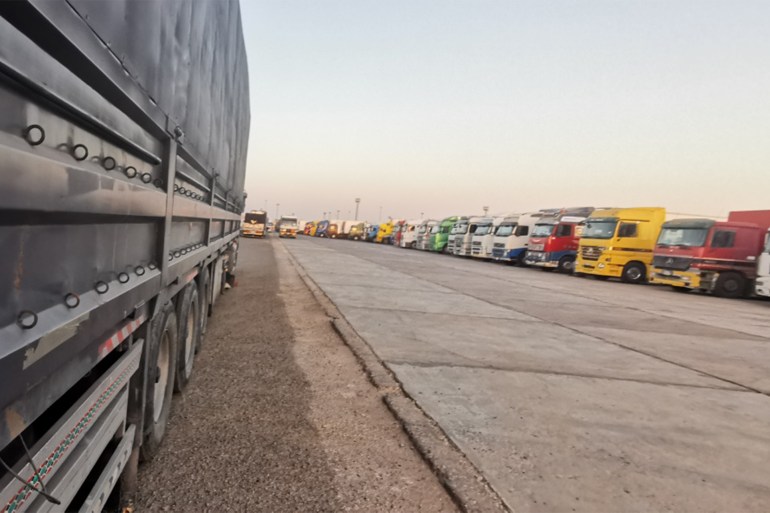Amman
- The opening of the Jordanian border crossing with Syria, "Jaber-Naseeb", did not come as the drivers and owners of trucks working to transport goods between the two countries had expected, as high freight charges and the danger of moving inside Syria impeded their work.
The reluctance to transport goods from Jordan to Syria and from there to Lebanon harmed the driver, Abdullah Al-Zoubi (52 years), as his business was disrupted and he is looking for work on trucks heading towards the Gulf.
Al-Zoubi tells Al-Jazeera Net that the fees imposed on trucks are high, and the loaded goods do not have a high financial return, in addition to the fact that entering the Syrian side is a great danger to the lives of drivers as a result of the unstable security conditions there.
The Jordanian authorities reopened the border crossing between Jordan and Syria (Jaber-Naseeb) at the beginning of this month, October, after understandings and official meetings between officials of the two countries, which allowed the transfer of goods and merchandise between the two countries, and the movement of passengers, cars and trucks.
prohibited goods
In addition to the high fees and the risks of traveling to Syria, the work of trucks hinders the list of goods, commodities and agricultural materials prohibited from being exchanged between the two countries. This list includes about two thousand goods that countries are prohibited from importing, according to importers and traders.
In addition, the ban on importing about 4,000 goods is prohibited, except for import licenses and the imposition of protection fees on them. The Jordanian decision to ban comes to "reciprocity", as the Syrian authorities prevent the import of a similar list of Jordanian goods and merchandise.
In the face of the state of disruption, drivers and owners of these trucks are complaining about the damage to their businesses and the continuation of a series of financial losses;
Fayounis Al-Ghanim, 59, a truck owner, complains about the high costs of freight and customs fees.
Al-Ghanim told Al-Jazeera Net, "Some of the loads that we transport are very simple, especially vegetables, compared to the value of fees and taxes paid on them," as well as "the high wages of drivers when transporting goods to and from the Syrian or Lebanese side due to security risks."
The two parties had signed in 1999 a joint agreement that specified fees for transporting goods on trucks, according to which Jordan charges fees of 109 dinars ($ 153), and the Syrian side charges ($ 120) for each truck, i.e. reciprocity, while its prices are currently without the application of an agreement Transportation between 800 and a thousand dollars, which is a huge loss for truck drivers in Jordan.
The list of goods, commodities and agricultural materials prohibited to be exchanged between the two countries hinders the work of trucks (social networking sites)
reciprocity
The reason for imposing fees on trucks - according to specialists - is due to the decision of the Syrian authorities to impose customs duties on trucks entering Syria, or those transiting towards Lebanon, with a value ranging between 800 and 1,000 dollars, and two thousand dollars for trucks departing towards Turkey, within a month. October 2018.
Jordan, as a matter of reciprocity, imposed in April 2019 customs duties on trucks coming from Syria of the same value, which constituted “additional financial burdens on truck owners and drivers and clearance companies,” according to the head of the Clearance Companies Owners Syndicate, Daifallah Abu Aqoula.
Abu Aqoula - to Al-Jazeera Net - added that his country's authorities, after canceling the "Back to Back" system, imposed new fees of 200 Jordanian dinars (280 dollars), which caused trucks to stop working, and to disrupt the import and export process, And the imposition of a permit fee from the Ministry of Transport of 70 dinars (100 dollars), with the trucks idling until the issuance of that permit.
Abu Aqoula called on the authorities of the two countries to cancel the fees imposed on trucks, and completely re-implement the memorandum of understanding and agreements previously concluded between the two brotherly countries, which were previously specified fees, with the need to facilitate and enhance the movement of trade exchange between the two countries, to reflect positively on reducing costs on exports and imports for both Both parties, and in order to contribute to stimulating the flow of goods that do not bear costs because their profits are low and traders are used to exporting them by land, according to Abu Aqoula.
On both sides of the border, between 100 and 120 Jordanian trucks travel daily, making up 10% of the volume of Jordanian trucks leaving for Syria before the start of the Syrian crisis in 2011. About a thousand Jordanian trucks entered Syria and moved from them to Lebanon, Turkey and European countries.
250 trucks travel between Jordan and Syria daily (social networking sites)
security risks
On the other hand, the Director of Customs Borders Jaber Colonel Ahmed Al-Quraan does not see that the customs duties imposed on the transport of goods between the two countries are what hinders the movement of trucks between Jordan and Syria. security, and their concern for their safety from any harm, as well as the high wages of drivers working on those trucks.
Al-Quraan told Al-Jazeera Net, "We deal daily with about 250 trucks coming and leaving to Jordanian territory after reopening the crossing. 70% of the truck traffic coming to the Kingdom goes to the Gulf countries."
The coming trucks transport vegetables and fruits according to the agricultural calendar between the two sides, and raw materials imported by Syrian investors who work in the Jordanian industrial zones, according to importers.
It is noteworthy that the volume of trade exchange between Jordan and Syria recorded in the first six months of this year 2021 amounting to 47.6 million dinars ($66 million), and Jordanian exports amounted to 27.8 million dinars ($40 million), while imports amounted to 19.8 million dinars (28 Million dollars).

